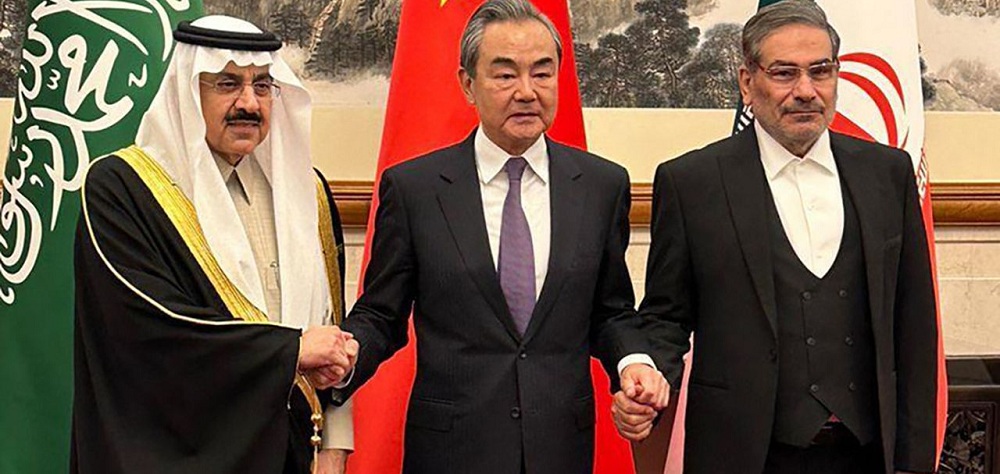Alwaght- After a 7-year diplomatic hiatus between Iran and Saudi Arabia, several-year mediatory efforts have come to fruition on Friday, leading to a historic statement ushering in a new chapter in their relations. The news came as a bombshell, making splash on world media outlets and drawing vast reaction at regional level. The deal followed several rounds of negotiations, the latest of which led by Iran’s Supreme National Security Council’s chief Ali Shamkhani and Saudi National Security Advisor Musaad bin Mohammed Al Aiban in Beijing.
The joint statement, which refers to the Iraqi role in five-round talks in 2021 and 2022, held: “As a result of the talks, the Islamic Republic of Iran and the Kingdom of Saudi Arabia agreed to resume their diplomatic relations and reopen embassies and representation offices within two months at most.”
There is no doubt that the resumption of relations between Iran and Saudi Arabia as two big Islamic countries and influential actors in the region is of great importance to developments in the region, and the type of official reactions of other countries and the media to this deal, which revolved around expectations of the positive effects of this agreement on strengthening the stability and security of the region, confirm this claim. Given the reality of the traditional Iranian-Saudi regional rivalry, which continued after shift of generation of rulers in Riyadh led by Crown Prince Mohammed bin Salman and adoption of an aggressive policy towards an open confrontation with Tehran, there is a question to ask: What effects would this deal leave on the geopolitical competitions between these two rivals?
Gordian knot of Saudi foreign policy
One of the most important factors driving Saudi Arabia and Iran to mending their diplomatic relations is the intentions and purposes of the two sides. Specifically for Saudi Arabia, the geopolitical rivalry case is the leading driver. Actually, Riyadh figured out the importance of dialogue with Tehran and demanding assistance from it to get rid of the impasse it run into as a result of the aggressive foreign policy of the new generation of its rulers, especially the historic mistake of waging a war on Yemen that soon turned into a quagmire for them.
The Saudi policy in recent years has been a showcase of the kingdom’s failure in its majorly hostile policy towards the rivals. A list of these setbacks includes failure of Qatar blockade, failure to oust Syrian President Bashar al-Assad, defeat in Yemen war, and frustration of Riyadh push to weaken Hezbollah in Lebanon. From this angle, although we cannot yet talk certainly about influence of the Iranian-Saudi de-escalation on the course of regional competition between the two countries, the alteration of their hostile views in their relations can correct the crisis-generating approaches that at the present strained time jeopardize regional peace and stability.
Boosting diplomacy and regional cooperation
Due to their historical, geopolitical, ideological, military, and economic factors, the two are important and influential powerhouses in the region and Muslim world, and its is for this reason that the nature and level of their relationship makes an important factor in upturn or downturn of regional cooperation and viability of diplomacy in settling the crisis, resolving disputes, regulating bilateral and multilateral ties, and advancing collective interests in various areas. Saudi Arabia has a leading role in some of the most important regional organizations like the (Persian) Gulf Cooperation Council and Arab League with which the Islamic Republic has always sought durable and respectful cooperation towards common interests. On the other side, Iran leads the game-changing Axis of Resistance— a bloc comprised of Iraq, Syria, Lebanon, Yemen, and Palestine— and Shanghai Cooperation Organization (SCO), an organization highly significant to the Saudis. Moreover, their regional weight as seen by other countries for regulating ties to each of them is eye-catching. For example, after closing their embassy in Tehran, the Saudis put heavy pressures on other Arab countries to follow in their footstep and on Arab organizations to take anti-Iranian postures. Or as another important example, we can refer to the interests of the mediating countries like Pakistan, Qatar, Iraq, and China from mending Iranian-Saudi relations. Therefore, we can conclude that rebuilding diplomatic relations between Tehran and Riyadh is effective in boosting of regional diplomacy and cooperation.
Hitting American and Israeli alliance-making efforts
Another important aspect of the Saudi-Iranian deal’s geopolitical effects is marginalization of the US and Israeli-favored regional alliances which are planned to rest on the continued waves of tensions between Iran and some Arab countries. Such a scenario was cited by various analysts in recent years as an alternative to the several-decade American regional policy after decline of Washington’s global hegemony and consequent decrease of military presence in West Asia and Persian Gulf so that the US can advance Iranophobia and Arab normalization with Israel and create an Israeli-Arab regional bloc to preserve the established regional security order for pursuit of its economic and political interests, with Israeli interests at its center.
Despite normalization of low-influence Arab countries with Israel since 2020, this US-Israeli plot went nowhere thanks to Iran’s efforts for protecting and strengthening close ties with the neighboring Arab countries, and this scheme will certainly be further cornered with Tehran-Riyadh de-escalation.



























